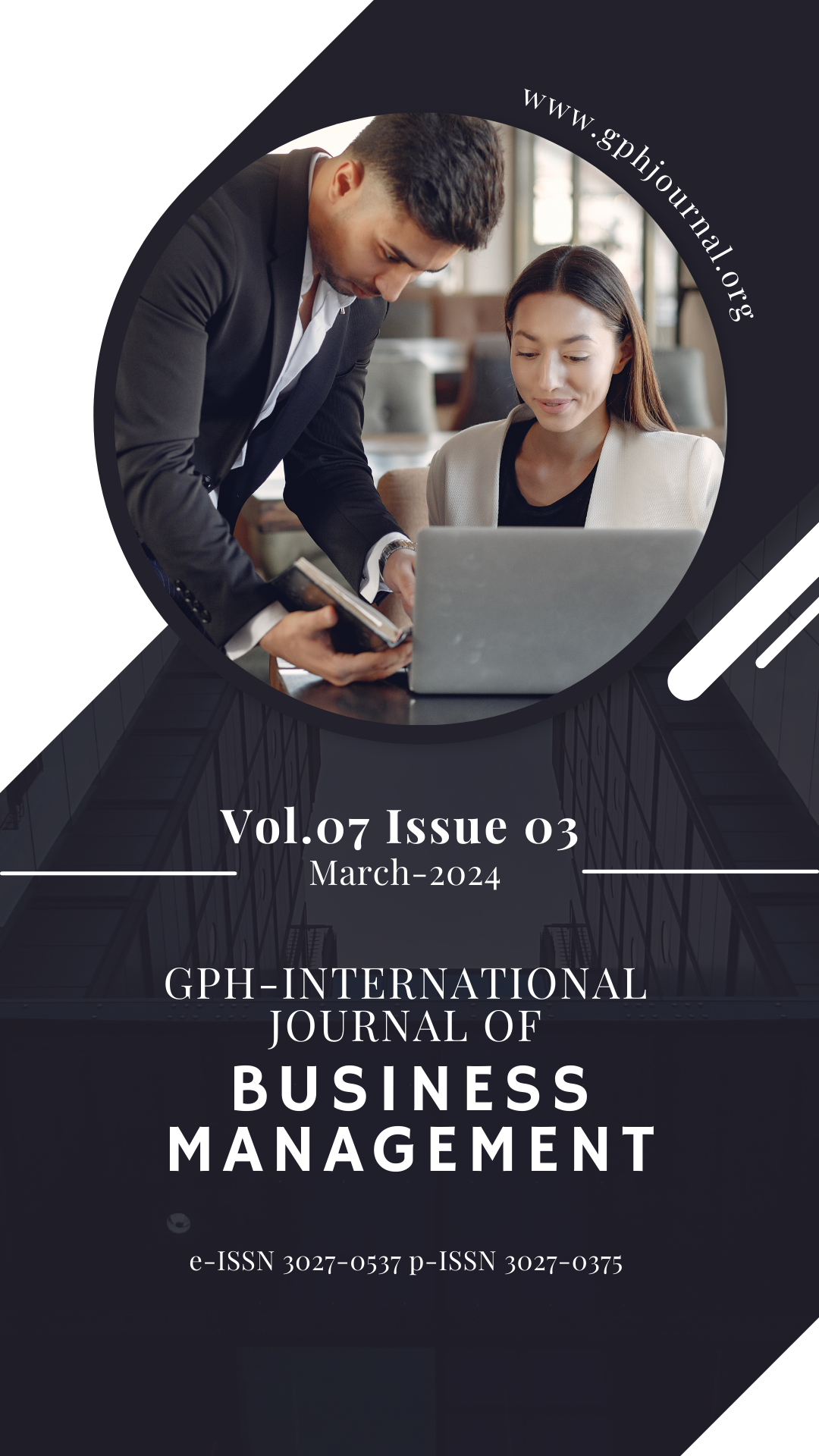CREATIVE ACCOUNTING PRACTICES AND FINANCIAL PERFORMANCE OF LISTED MANUFACTURING COMPANIES IN NIGERIA
Abstract
This study examined the relationship between creative accounting practices and reported financial performance of listed manufacturing companies in Nigeria, and the extent creative accounting practices proxied by related party transactions (RPT), impacts on financial performance measured with return on assets ‘ROA,) and return on equity (ROE,). Five year financial data from 2018 to 2022 often companies listed on the Nigerian Stock Exchange group (NSE) were extracted using the stratified and simple random sampling techniques. The study used secondary sources of data extracted from the published financial statements and accounts of the sampled companies. Data analysis techniques used in this study included descriptive statistics, the ordinary least square (OLS,) regression techniques using the Statistical Package for the Social Sciences (SPSS) version 22.0 statistical software. The results obtained revealed that RPT has positive and significant relationship with ROA. In relation to ROE, the results revealed that RPT has a negative and significant impact on ROE. The coefficient of determination as revealed from the combined impact of the independent variable shows that 99.9% of the variation in the dependent variables is explained by the independent variables while the remaining 0.1% is attributable to other factors. The exposition from the data analysis clearly points to the fact that listed manufacturing companies in Nigeria use creative accounting practices to manipulate earnings or profits in order to achieve management desire to present impressive financial performance of the entity. The work concluded that the desire to showcase impressive picture of corporate financial performance often breaches professional ethics in financial reporting The study recommends a more stringent regulatory regime with effective enforcement mechanisms to ensure compliance with International Financial Reporting Standard and Auditing standards in order to reduce creative accounting practices. The introduction of punitive measures could also assist in curbing the act of creative accounting amongst Nigerian companies.
Downloads
References
Akenbor, C. 0 and Ibanichuka, E.A.L. (2012). Creative accounting practices in Nigerian banks. An International multidisciplinary journal Ethiopia, 6(3), 23-41.
Angahar, P. (2017). An evaluation of the regulatory framework for the prevention of’ misstatement of financial statements in Nigeria. Global Advanced Research Journal of Management and Business Studies, 1(x), 051-060. Association of Certified Chartered Accountant Learning Media (2012). Financial reporting international and United Kingdom, I3PP, London.
Baridam. D.M (2001). Research Methods in Administrative Sciences. Port Harcourt: Sherbrook Association.
Berk, T.D. (2021).The firming of assets sales and earnings manipulation. The Accounting Review Journal, 68, 1-23
Copeland, R. M. (2018). Income smoothing. Journal of Accounting Research, 6(1), 101-116.
Davidson, Paul (2018). Financial Markels, Money and the Real World, Cheltenharn, UK Edward Elgar.
Douglas, A.L, W.G William and R.D Mason (2020), Statistical Techniques in Business and Economics, Boston; McGraw-Hill Irwin
Gowthorpe, C and Amat, O. (2015) Creative accounting: Some ethical issues of macro and micro manipulation. Journal of accounting horizons, 4, 1-33.
Gramlick, J.D, McAnaIly, M.L and Thoma, J. (2011). Balance sheet management. The case of short-term obligations reclassified as long-term debt. Journal of Accounting Research, 39, 283-295.
Helfert, E. A. (2021). Techniques of financial analysis, Seventh edition, New York, McGraw-Hill.
Heyworth, S. R. (2013). Smoothing Periodic Income. The Accounting Review, 32-39.
lbanichuka, E.L.A and lhendinihu, J. U (2012). Creative accounting and implication for dividend payout of companies in the financial sub-sector of Nigerian economy. Mediterrunean Journal of Social Sciences, 3, 125-139.
Ghosh, S. (2020). Creative accounting: A fraudulent practice leading to corporate collapses. Journal of Research and Practice in social sciences, 6(1), 1-1 5.
Ginouxy, G. (2016). Earnings magic and unbalance sheet: The search for financial reality. Wiley mc, New Jersey.
Imhoffy, E.A. (2021) Accounting auditing and cooperate governance. Accounting horizon Supplement 17
Griffiths, I. (2015). New creative accounting. Sidewick and Jackson, London.
Gujarati. D. (2019). Basic Econometrices, Mc Graw, New York, United State of America.
Herrmann, D. Inoue, T and Thomas, W. B (2018). The sale of assets to manage earnings in Japan. Journal of Accounting Research, 41, 89-109.
Jonas. S. (2015). Essays on earnings management. http:/web,hearflu FDPE /document/capital. PDF.
Mulford, C.W and Comiskey, E. M (2022). The financial numbers game: Detecting Creative accounting practices, Wiley mc, New York.
Onwumere, J.U.J (2015), Business and Economic Research Method, Lagos; Don-Vinton Limited.
Osahon, O.H (2012). Creative accounting and firm’s market value in Nigeria. Journal of Business and Management Review, 2, 38-50.
Osaze, B.B (2018). Creative accounting: Poison or positive inequity. The Nigerian Accountant. July/Sep. 32-35
Osemene, O. F (2014). ‘Creative accounting and bank performance: evidence from Nigerianbanking industry. Fountain Journal of Management and Social Sciences, 3(2), 23-33
Osisioma, B. C. and Enahoro, J. A. (2016). “Creative Accounting and Option of Total Quality Accounting in Nigeria”; JournalofGlobalAccounting; 2(1); 5-15
Palmrose, Z.V and Scholz. S (2014). Determinant of market reaction to earnings restatementannouncement. Journal ofAccounting and Economic, 1, 37-51.
Revsine, L. (2021). The selective financial misrepresentation hypothesis. Accounting Horizons, 16-27.
Schipper, K. (2019). Commentary on Earnings Management. Accounting horizons, December, 91-102.
Sen., D. K and Inanga, E. L (2015) Creative Accounting in Bangladesh and Global Perspective. http://www.allbusiness.com
Shehu, U. H. and Abubakar A. (2012). ‘Corporate Governance, Earnings Management and Financialmanipulation’, Journal of Business Ethics, 3(4), 20-22.
Sulton, J. (2020). Corporate financial accounting and reporting, financial times. Prentice Hall.
Sweeney, A. (2014). Debt Covenant Violations and Managers Accounting Responses, Journal ofAccounting and Economics, 281-308.
Valduxy, A. B. (2020). Corporate governance and creative accounting. Journal of Annales University, 12,
25-35.
Copyright (c) 2024 Dr. Solomon Egbe

This work is licensed under a Creative Commons Attribution-NonCommercial-NoDerivatives 4.0 International License.
The authors and co-authors warrant that the article is their original work, does not infringe any copyright, and has not been published elsewhere. By submitting the article to GPH-International Journal of Business Management, the authors agree that the journal has the right to retract or remove the article in case of proven ethical misconduct.




























